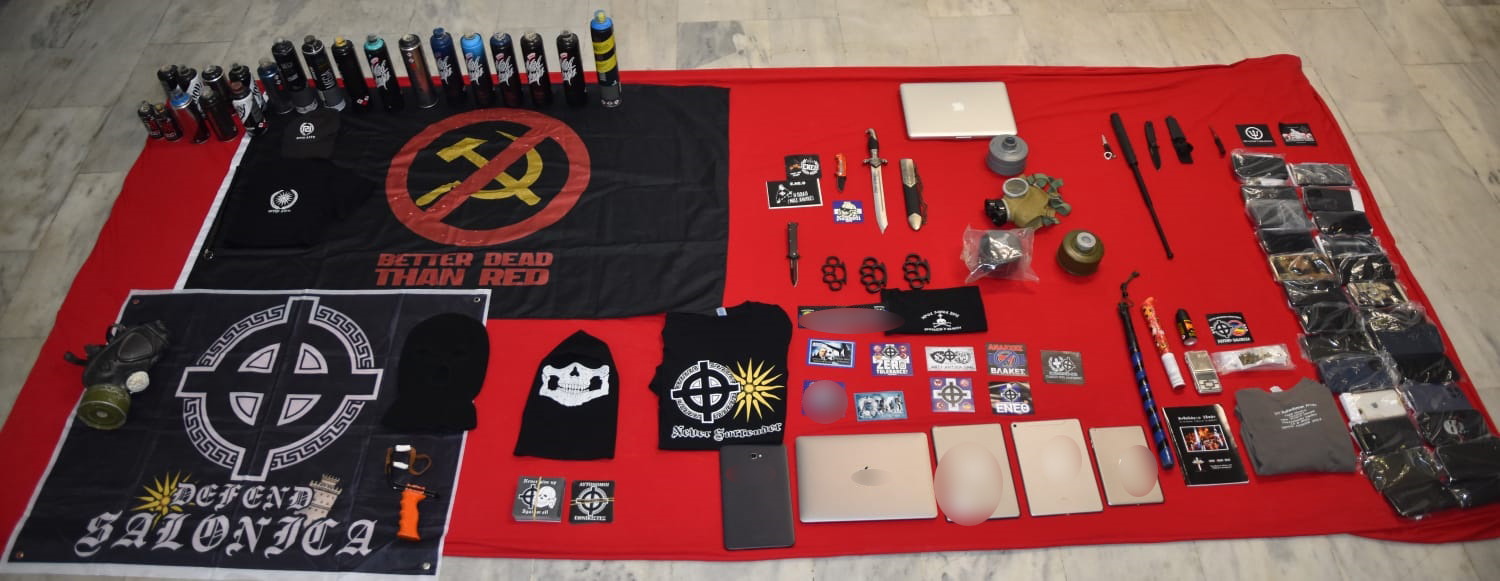28 members of far-right group arrested in Thessaloniki

Greek police have arrested 28 individuals in Thessaloniki believed to be members of the far-right group "Nationalist Youth of Thessaloniki," also known as "DEFEND SALONICA." Among those detained are 15 adults and 13 minors.
The arrests followed a large-scale police operation on Wednesday and involved people aged between 16 and 28. According to the Greek Police Headquarters, the group has allegedly been active since at least 2019 and is accused of committing a series of violent and criminal acts with racist overtones, including assaults, robberies, thefts, and property damage.
During the investigation, authorities found and seized various nationalist symbols and weapons – including brass knuckles, knives, a sword, and batons. According to Reuters, the group used membership fees to fund banners, helmets, flares, and batons, and targeted individuals with leftist or anti-establishment views.
Police say the suspects have been linked to a number of offences, either as perpetrators, instigators, or accomplices, committed between September last year and March this year. Some members had previously drawn the attention of authorities, including during an incident in September 2021, when student activists were attacked during an anti-racism protest outside a school in western Thessaloniki.
In a detailed statement, Greek police described the group as a structured criminal organisation operating under the guise of a far-right collective. The investigation, which spanned several months, was led by the Racist and Extremist Violence Division in Thessaloniki, with support from other specialised units.
The suspects are facing a wide range of charges, including: human trafficking, recruiting minors for criminal acts, robbery, forming a criminal organisation, assault (including aggravated assault), vandalism, inciting violence, and offences under legislation covering hate crimes, weapons, drugs, fireworks, sports-related violence, and data protection.
Key findings from the investigation highlight the group’s organised structure:
- Members used specific online platforms to communicate in order to avoid detection.
- The organisation was financially self-sufficient, funded through member contributions, which paid for materials like banners, helmets, and fireworks.
- They maintained a strong presence on social media, promoting their far-right ideology and illegal activities.
- A clear hierarchy was in place, with older and adult members taking on leadership roles and directing others.
- Some members were tasked with specific roles such as sourcing supplies, scouting targets, graffiti, assaults, and recruitment.
- The group made ongoing efforts to recruit new members.
- They often participated in rallies and events alongside other nationalist groups, wearing clothing and symbols associated with their organisation.
Police have linked the group to several incidents, including:
- Vandalising schools, political party offices, and community centres in the Neapoli and Efkarpia areas, where nationalist slogans and symbols were displayed.
- Two violent robberies involving threats with knives, during which four victims were stripped of mobile phones, a bank card, and a football club sweatshirt.
- An attack on rival football fans during a basketball match in Oraiokastro, which escalated into a violent clash involving objects and resulted in injuries.
Searches carried out at the homes of those arrested turned up:
- Clothing and fabric items bearing nationalist symbols, along with stickers, books, and printed materials with racist and group-related insignia.
- A stockpile of weapons including brass knuckles, knives, a sword, metal and wooden rods, hunting ammunition, a slingshot, and an improvised explosive device.
- Two cannabis packages and a precision scale.
- 33 mobile phones, six computers, and two gas masks.
All 28 individuals are to be brought before the relevant judicial authorities.
______________________________________________
Are you seeking news from Greece presented from a progressive, non-mainstream perspective? Subscribe monthly or annually to support TPP International in delivering independent reporting in English. Don’t let Greek progressive voices fade.
Make sure to reference “TPP International” and your order number as the reason for payment.